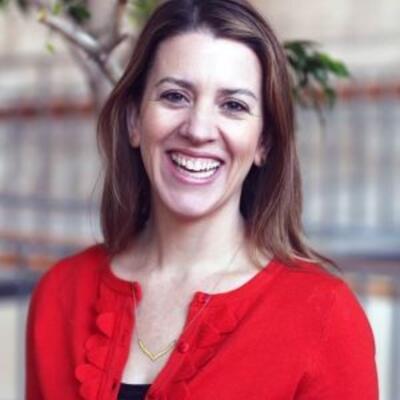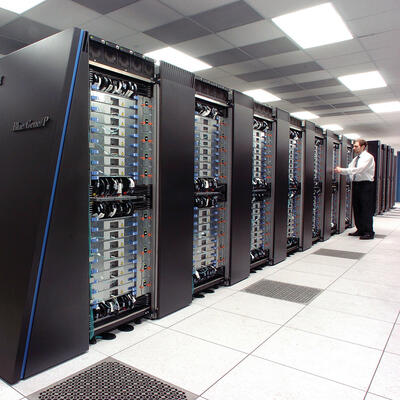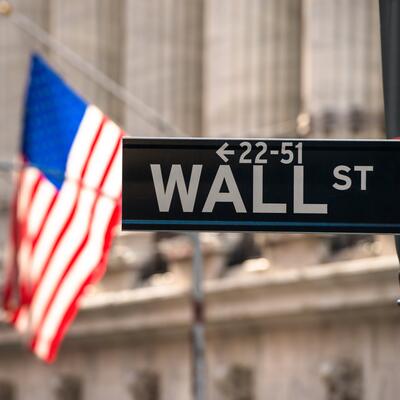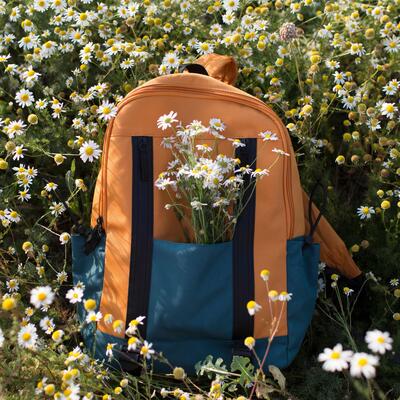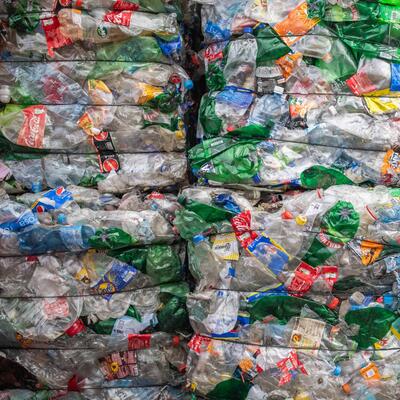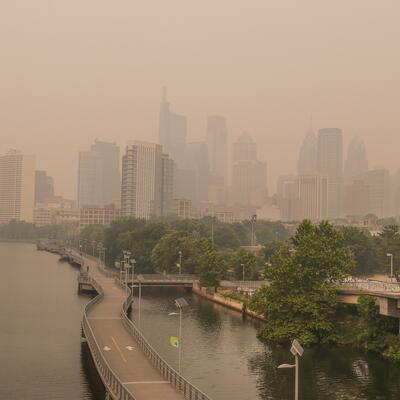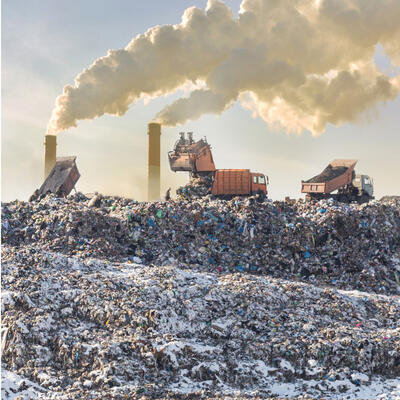
Inconspicuous Consumption: The Environmental Impact You Don't Know You Have
Guests
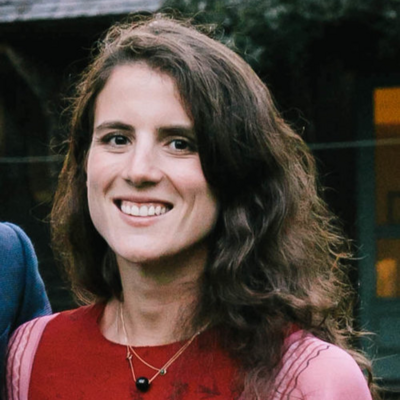
Tatiana Schlossberg
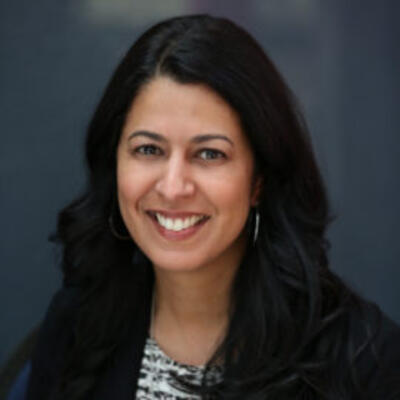
Amina Razvi
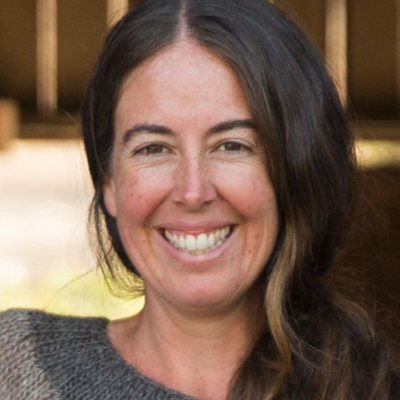
Rebecca Burgess
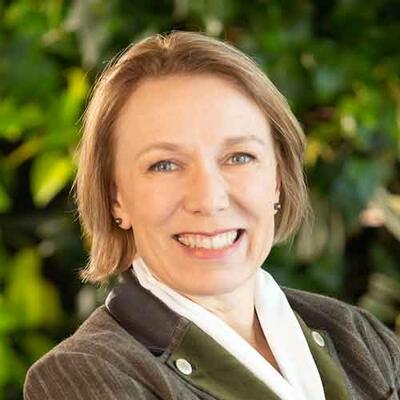
Miranda Ballentine
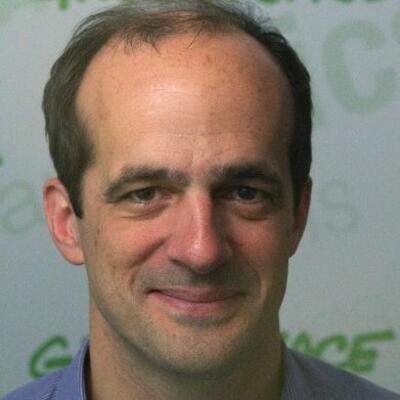
Gary Cook
Summary
Everyday choices – like which shirt to buy or where to binge-watch shows – may impact the planet more than you think. But how far can individual choices take us, and when is it up to companies and producers to take the lead?
“You can drive yourself crazy trying to make the most ethical choice,” says former New York Times science reporter Tatiana Schlossberg. “It's almost impossible to make an impact free choice in our current system.”
Schlossberg is the author of Inconspicuous Consumption: The Environmental Impact You Don't Know You Have, in which she argues that everyday consumer choices may not change the carbon economy, but they’re an important part of being the kind of person who acts in more collective and impactful ways.
“I don't think we should feel individually guilty necessarily for our consumption,” Schlossberg says, “but we should feel collectively responsible for fixing the systems and building a better world.”
Among the choices we make where our carbon footprint may be hidden in plain sight is in what we wear. Rebecca Burgess, founder and director of Fibershed, a nonprofit that helps develop regional and regenerative fiber systems for clothing producers, believes that our clothing choices can be as significant as our food choices.
“If I eat local, can I wear local? If I eat organic, am I wearing organic?” she asks. “If I’m interested in climate smart agriculture, how am I wearing those values and the fibers that I'm wearing each day?”
Burgess believes we need to re-think our relationship to our wardrobes. “Think about the timelessness of the piece,” she advocates, “think about wearing a garment or purchasing a garment that's gonna be with you for the long haul. Love it. Really be a custodian not a consumer.”
Related Links
Inconspicuous Consumption: The Environmental Impact You Don't Know You Have
Fibershed
Sustainable Apparel Coalition
Greenpeace
Renewable Energy Buyers Alliance
Full Transcript
Greg Dalton: This is Climate One, changing the conversation about energy, the economy, and the environment. [pause] Everyday choices – like deciding what to buy or binge-watch tonight – may impact the planet more than you think.
Tatiana Schlossberg: It's almost impossible to make an impact free choice in our current system.
Greg Dalton: But how far can individual choices take us – and when is it up to companies and producers to take the lead?
Amina Razvi: If you are a business and you want to remain in business, I think it's imperative that you're looking at not only all of the risks but the opportunities as well that sustainability can present.
Greg Dalton: Does focusing on individual action distract us from changing the economics that encourage us to accumulate more stuff?
Tatiana Schlossberg: I don't think we should feel individually guilty necessarily for our consumption. But we should feel collectively responsible for fixing the systems and building a better world.
Greg Dalton: Inconspicuous Consumption. Up next on Climate One.
---
Greg Dalton: How much can individual consumer choices change the carbon economy? Climate One conversations feature oil companies and environmentalists, Republicans and Democrats, the exciting and the scary aspects of the climate challenge. I’m Greg Dalton.
Greg Dalton: The small choices we make everyday can have a big collective impact on climate. But experts say individual actions can only get us about 30 or 40 percent of the way to safety. The rest falls on governments and companies.
Miranda Ballentine: Is every company ready to make their individual brand heard on particular policy measures? No, they’re not.
Greg Dalton: Miranda Ballantine is CEO of the Renewable Energy Buyers Alliance, a coalition of companies across the U.S. When a major corporation chooses to operate on clean energy, it sends a strong signal about what kind of economic actor that business wants to be. The same is true for individual identity.
Rebecca Burgess: If I eat local, can I wear local. If I eat organic, am I wearing organic?
Greg Dalton: Rebecca Burgess is Founder and Director of Fibershed, a nonprofit that helps develop regional and regenerative fiber systems for clothing producers. We’ll hear from her, Miranda, and others later in the show. Buying an organic or locally-sourced shirt has an impact that is puny compared to pumping cleaner energy into a large company’s data center. But Tatiania Schlossberg, says it’s an important part of being the kind of person who acts in more collective and impactful ways. Tatiana is a former New York Times reporter and author of Inconspicuous Consumption: The Environmental Impact You Don't Know You Have. We began our discussion about the climate impacts of our everyday choices by walking through a typical morning.
Tatiana Schlossberg: So I wake up and I look at my phone, probably. So that’s the first thing. And you know, our phones and all of our devices have, you know, are produced using lots of metals and rare-earth materials and they travel many, many thousands of miles before they reach us. So there’s that carbon impact and then using the Internet itself, uses electricity so, you know, within the first few seconds I've made a dent. And then I have I guess I have my breakfast. I do love yogurt so that has a big carbon footprint in terms of livestock production is 15% of global greenhouse gas emissions. I have some tea with milk, so already I’m not doing great.
Greg Dalton: 15 or 50 depend on who --
Tatiana Schlossberg: Yeah, exactly yeah.
Greg Dalton: Debatable number there that’s the whole debate.
Tatiana Schlossberg: Well, I guess then I get dressed. So depending on what I'm wearing pair of jeans, it’s a lot of water if it's I’m going exercise its synthetic fibers made from oil. And then well I live in New York so I usually walk somewhere. But let's say I got into an Uber then I would be adding miles to the road and, you know, burning gasoline to get wherever I'm going. So within like the first hour you can really kind of go around the world and back.
Greg Dalton: You write pretty early on that “we focus on the little things in the hope that they matter. So we can feel like we at least did something when the apocalypse comes. In the aggregate, these little things can matter.” So tell us how, are we really making a difference or we just addressing our conscience when we make these little changes?
Tatiana Schlossberg: Well, I think all these things are connected and, you know, I stress in the book in the beginning and throughout that this problem is too big to be solved by individual behavioral changes. Because it's hard to get 7 billion people to do anything without some kind of government regulation, or international agreement or corporate action. That being said, you know, I think it's important for me and for people who care about this issue to try to live in line with our values because, you know, I want to be the kind of person who if I learn more information about the harmful things that I'm doing that I act on them. Not because I think that that's enough to solve the problem but because, you know, maybe these things do add up and maybe they matter but also kind of the consciousness around it will remind me hopefully to act in the more collective and impactful ways that I can. Like voting or, you know, if I put pressure on a company should do better and to talk about climate change as well.
Greg Dalton: So you do it to be the kind of person that you feel you should be not because of its impact in the big picture?
Tatiana Schlossberg: Yeah. I think, I mean obviously, you know, there are things that have that contribute more than other things. You know, like eating red meat or taking an airplane flight I mean those things contribute significantly. But I think me taking, eating one fewer burger a week doesn't do that much because the system is so big and the incentives are so off. That really to fix that and to, you know, reduce the emissions associated with beef production and to prevent things like rural drinking water pollution or a dead zone in the Gulf of Mexico. The system needs to be changed as well. And I don't know that that happens just from, you know, people who care about this eating a little less red meat.
Greg Dalton: I think that's you know, what I try to work on is that bridging that the personal and the systemic.
Tatiana Schlossberg: Yeah.
Greg Dalton: It so hard. Because people are part of systems and yet, we don't know how to change systems.
Tatiana Schlossberg: Right.
Greg Dalton: Thinking system is for you know, PhD brainiacs it was like way beyond my ability. So how do you bridge and you write that the size of the problem and the narrative of personal responsibility is destructive.
Tatiana Schlossberg: Yeah.
Greg Dalton: Unpack that.
Tatiana Schlossberg: Well, I think you know, the narrative around personal responsibility the idea that if you know, we had all just brought our own reusable grocery bags to the store 20 years ago, we wouldn't be in the situation. It makes us I think makes me anyway feel kind of guilty and turn inward and turn away from the problem and to really look at myself as opposed to, you know, what are the systems what are the incentives that exist to make, you know, how does the system work in a way that encourages more consumption and more waste and more emissions that is sort of disconnected from my role as an individual. And I also think that focusing so much on the individual distracts us from who is actually responsible for this problem. And the people who are mainly responsible are fossil fuel companies and lobbyists, and people who take money from them. And, you know, those who have been not only kind of standing in the way of progress but also making our chances of fighting it so much worse. And so, you know, I don't think we should feel individually guilty necessarily for our consumption. But we should feel collectively responsible for fixing the systems and building a better world.
Greg Dalton: I do feel guilty sometimes, I mean --
Tatiana Schlossberg: It’s hard not to feel guilty.
Greg Dalton: As a white man, I have a lot of privilege in this world.
Tatiana Schlossberg: Yeah.
Greg Dalton: I grew up in -- I live in San Francisco one of the wealthiest cities in the wealthiest country. So you tell me it's okay if I don't feel guilty.
Tatiana Schlossberg: No. I mean, I think, you know, there's a healthy amount of guilt and shame. I just think that I don't know that it's necessarily a powerful motivator in trying to fix anything. Like maybe for some people it is but I think for other people it makes them resentful of the messaging that told them to feel guilty when they didn't know that they were necessarily doing something bad. And so that's what I've tried to address in my book is, you know, one of the things I write about for instance is like denim production. And producing jeans can use many, many thousands of gallons of water just to make one pair of jeans. But if I'm standing in the store trying to figure out which pair of jeans to buy, it’s going to be impossible for me to figure out which of those jeans was produced using the least amount of water. And so I don't know that it's necessarily -- it should be the company's responsibility to have more control over their supply chain and see where the waste is occurring and then try to reform those practices. And so I think you know, in that way I don't know that me feeling personally guilty about owning a pair of jeans fixes that problem.
Greg Dalton: You come down pretty strongly on the side of producer responsibility versus consumer responsibility. Most people think it’s somewhere shared. Because if people think that they have no responsibility for what they buy then that’s not right either. So it’s some shared responsibility. Is that fair?
Tatiana Schlossberg: Yeah, I think I’m not saying that, you know, we can all like fly with abandon and eat as much red meat or wear as much cashmere as we want. Because once you learn this stuff you have to act on it because otherwise what's the point of knowing it. And if you limit the options of what's available I think like a good example is with light bulbs. Like if you got rid of incandescents and you only had LEDs or compact fluorescents then you wouldn't have the problem of having this wide variety of efficiency in light bulbs. So I think kind of limiting it at the market level or at the regulatory level is the most effective way to do it.
Greg Dalton: Yeah, there’s been a lot of pushback on that front. You write about going around to friends’ houses and plugging in power meters, etc. What goes on with your friends in terms of kind of judging and watching sort of the virtue police of, you know, people watch you or you watching your friends about, is that ice cream? I know you like ice cream, so, right.
Tatiana Schlossberg: Yeah. I do like ice cream. It’s complicated. I think I've become maybe a less popular dinner party guest because people will ask me like, you know, how bad is this thing and then I'll tell them, and then they'll be mad and --
Greg Dalton: They’ll feel guilty being around you.
Tatiana Schlossberg: Exactly. The next time I see them like well I bought this at Zara, but don’t tell Tatiana. But, you know, I think the level of curiosity from among my friends has made me feel that this topic and this approach is really valuable. I think sometimes as I've been doing my book tour I've gotten some questions like, well, what’s the carbon footprint of your book and what's the like your dress made of. Which, you know, it's not invalid but I think that there has been a long tradition of those who don't want to fight climate change or make progress in this area to try to point out the hypocrisy of those who are trying to deliver a message about it. And I think it's almost impossible to make an impact free choice in our current system. And so I think that that is really a distraction from the message as a whole. Like what Tatiana Schlossberg is doing, you know, I don’t really think that that is -- that's not an important way to have this conversation.
Greg Dalton: And if being a carbon saint is required to be involved that means --
Tatiana Schlossberg: Yeah, we’re all excluded.
Greg Dalton: We’re all carbon sinners.
Tatiana Schlossberg: Yeah. Exactly, yeah.
Greg Dalton: Do you ever get fatigue --
Tatiana Schlossberg: Yes.
Greg Dalton: Like I think about it I sit on the couch I'm worried about the fire retardants on the couch, I’m looking at the TV. I learned in your book that the TV even if it's not used for a whole year, you use an average carbon, emits average carbon --
Tatiana Schlossberg: Same electricity consumption as per cap or I think --
Greg Dalton: Kenya and Haiti --
Tatiana Schlossberg: Yeah. Yeah.
Greg Dalton: And so, and then I’m thinking about all the things around me that are bad and my wife is like okay shut it off, turn it off. I mean do you ever get fatigued with sort of this climate awareness that kind of just run away with you?
Tatiana Schlossberg: Yeah, I mean part of kind of doing all this research makes it paralyzing to go to the grocery store. But, you know, I do feel that I'm glad to have written the book because and maybe you feel this way too now, I don’t have to be alone with this information.
Greg Dalton: It's a burden and a responsibility to be climate conscious.
Tatiana Schlossberg: Yeah.
Greg Dalton: And it can be a little bit lonely.
Tatiana Schlossberg: Yeah. Yeah, there's definitely, you know, loneliness to it and it does really feel really overwhelming at times. Because even if you hear some good news often there's the other side of the coin. So, yeah it's really hard and I think that's also one of the things I wanted to achieve in the book is to explain why this is such a big and complicated problem and difficult to solve. Because I think sometimes we hear things like, well we know that solar and wind energy exist like why can't we just get all of it from that. But really that requires developments in either battery technology or pump hydro storage or in the transformation of the electricity grid. And those things are really difficult to achieve. And so I think it's important to fully understand the problem because otherwise you probably won't be able to do what's necessary to solve it.
Greg Dalton: Right. You write about the five stages of environmental grief, denial, anger, this was a new one. This was clearly riffing off Elisabeth Kubler Ross but I don’t think trying to use less plastic, that’s a new one. Denial, anger, depression and determination. Tell me about you going through those phases, you know, as you are writing this book and learning about the gravity of climate.
Tatiana Schlossberg: Yeah. Well, I think, before I became a climate environmental journalist I didn't want to read about it that much. Because it did make me feel so anxious and sort of upset and powerless as I think it makes many people feel that way. So there's denial there. You learn more about it that's anger, you get angry. Depression, you know, it feels overwhelming, like we were just saying trying to use less plastic always. And then determination to be I think you know, for me understanding this issue, you know, doesn't make me feel less scared or less alarmed and it makes me feel slightly less anxious because I do feel that I understand the problem and I understand, you know, I can evaluate for myself what politicians are proposing or what companies are saying and whether it's enough or whether it's green washing. And that makes me feel, you know, like I guess a determination to keep doing that and to keep asking those questions and figuring out what's necessary. And so, I hope that my book kind of helps people kind of go along that journey as well and come out the other end feeling motivated.
---
Greg Dalton: This is a Climate One conversation about Inconspicuous Consumption. Coming up, more with author Tatiana Schlossberg, plus fashion experts on ways to reduce the carbon impact of our clothing.
Rebecca Burgess: Think about timelessness and the piece. Think about wearing a garment or purchasing a garment that's gonna be with you for the long haul. Love it. Really be a custodian not a consumer.
Greg Dalton: That’s up next, when Climate One continues.
---
Greg Dalton: This is Climate One. I’m Greg Dalton, and we’re talking about our hidden carbon footprints with Tatiana Schlossberg, author of Inconspicuous Consumption: The Environmental Impact You Don't Know You Have. One of the more surprising things Tatiana writes about is the relationship between the surge in home delivery, and the demand for cardboard.
Tatiana Schlossberg: I wanted to write about e-commerce because I wanted to see for myself if sort of all the handwringing about cardboard and the carbon pollution and people feeling guilty about things being delivered to their house, is that really kind of bore out in terms of whether that was, you know, worse for the environment or not. And it was really interesting to learn that, you know, over the last 10 years or so I think e-commerce has quadrupled in size in terms of value, but the cardboard production in the U.S. stayed relatively the same. But we’re at a lot worse, like it used to all go the retailers and they’re really good at recycling it and we’re much worse at recycling it. So that's kind of a problem. And then when we drive to the store we’re much less efficient at planning our routes than the big logistics company like FedEx or UPS. So that actually might be more efficient but we kind of screw that all up when we do next day or two-day delivery. And so I think part of the problem sometimes the systems are the problem, sometimes the problem is the way that we use the systems.
Greg Dalton: Well, after I read that I ordered some shaving cream online. And I saw, oh okay, so rather than going down to the store. You also write about opposition to GMOs you kind of take a swipe at, you know, liberals who are opposed to GMOs you say that that is kind of scientifically blissfully ignorant.
Tatiana Schlossberg: Well, I think people have kind of talked about it as if it’s a health risk to us which it's not. And you know, GMOs here and maybe something that’s preventing pesticide additional pesticide use or things like that. But in other parts of the world it means Vitamin A enriched rice that can prevent a lot of people from going blind. And so I think it's kind of a misunderstanding of what GMOs are and what value they actually can provide. And also a misunderstanding what the risks are. The risks are you know, this power concentration in putting farmers out of business and maybe affecting, I mean there's some biodiversity concerns I think. But in terms of kind of the health risks to humans that's really not an issue.
Greg Dalton: It's about power and monoculture and those things. It’s not about the things that people like to scare about GMOs.
Tatiana Schlossberg: Right. I think that it’s important to understand why we're opposed to certain things, as opposed to just because again that's a sort of problem where you need to address the system as opposed to kind of thinking about it in terms of how it affects you as an individual.
Greg Dalton: So individual choices are insufficient they’re important for identity and for values. What are some of your top tips for example, don't use a gaming console the stream videos that's a bad one. What are your other top tips?
Tatiana Schlossberg: Well, I think you know, some of the things we’ve mentioned you know, eating less kind of red meat and beef products and other meat. You know, flying less or not at all. I think buying secondhand is a really good option. Renting clothes is a good option. And then sort of --
Greg Dalton: Renting clothes.
Tatiana Schlossberg: Yes. Like rent the runways. I don't know if the same things exist for men. I mean again, you can drive yourself crazy trying to make the most ethical choice. And that's why I think I stress in the book that the most important things to do are to vote and to you know, not support companies that aren’t at the very least transparent. And also to talk about climate change because you know, only about a third of Americans talk about climate change with their friends and family. But if they do talk about it, they're more likely to consider it a risk and to support policies to mitigate it. And so, I think that that is a really important thing that anybody can do.
Greg Dalton: So you're saying persuasion should happen, right? To convert people into, I hate this metaphor, but the choir, right. To get people on the bus or in the choir.
Tatiana Schlossberg: Well I think, yeah and you know, these conversations don't have to exclusively be about climate science to be talking about climate change. And there are lots of different ways that these issues manifest themselves. And so, I think another theme in the book or something I’m trying to draw out is the issue of environmental justice. And, you know, so many of us are especially non-white communities, low-income communities and rural communities are disproportionately impacted by the direct effects of burning fossil fuels for energy. And there are lots of different people who are affected by that no matter what state they live in or you know, if it's red or blue or whatever. So I think you don't have to necessarily even make the conversation about what greenhouse gas emissions are doing to the planet to show people that a fossil fuel intensive economy is not good for most people. And that, you know, a lower carbon or a zero carbon future would actually be better for all of us for our health and kind of for the different opportunities for solutions.
Greg Dalton: It’s all though within the frame of consumption. It's all about, you know, and so some people would say consumption is the problem. Do you think that voluntary virtuous restraint is viable and achievable cause we all struggle with?
Tatiana Schlossberg: Right. Yeah, you know, I don't think we can shop our way out of the problem. So, that's one thing. And I don't know that telling everybody to buy less is effective. But that's why I think my focus is not on sort of telling people what to do or what to buy and what not to buy. But really understanding how these systems work and how the incentives are off, you know, in terms of both kind of their economic impact for most of us, but also the wider impacts in terms of, you know, health and environmental costs. And you know, we risk applying pressure in the wrong places if we don't understand how all the systems work and how they work together. And so that was more of my goal rather than sort of trying to tell anybody what to do. And I was often pressed by my editor like can you provide more solutions. But, you know, I didn't want to be dishonest in that way because I do think that you know, these problems are big and require systemic and structural change as opposed to sort of you know, all of us just or those of us who care really taking this on. Because there are generally speaking aren't enough of us to really make that matter.
Greg Dalton: So where do you end up, oftentimes people talk about they’re hopeful. I think sometimes people feign hope they're not quite as hopeful as they say they are because they think they’re supposed to say they're hopeful. So after writing this book where are you on the hope spectrum?
Tatiana Schlossberg: Well, I do think that a lot of the problems are incredibly big and complicated and it's hard to see how they’re fixed. But I am incredibly inspired by all the other young people who are really, I mean kids who went on the climate strike and how much pressure the Sunrise Movement and others put on like the DNC even though the DNC didn't have the climate debate. And, you know, things like the Green New Deal and that is that we’re kind of having a national conversation that includes that sort of radical action. To me that's a big change from even a few years ago. And I am also personally inspired by, you know, our more slightly more distant history of the 1970s and the environmental movement there. Because without that action on the first Earth Day and also the organizing around the 1970 midterm elections you know. If they hadn't defeated kind of seven of these 12 members of Congress at the worst environmental voting records we probably wouldn't have the expansion of the Clean Air Act and the Clean Water Act and the Endangered Species Act. And so many of these other regulations that really have changed what it's like to live in America. And so, I think that's an incredibly to me powerful and poignant example of what is possible.
Greg Dalton: Tatiana Schlossberg, author of Inconspicuous Consumption: The Environmental Impact You Don't Know You Have. You’re listening to Climate One. I’m Greg Dalton. Another place where our carbon footprint is often hidden in plain sight is in what we put directly on our bodies every day.
Amina Razvi: Yoga pants, bicycling shorts, you know, denim jeans. What does that material look like, you know, where is it coming from what’s the environmental impact of it.
Greg Dalton: Amina Razvi is Executive Director of the Sustainable Apparel Coalition, a business alliance that measures environmental, social and labor impacts across the clothing, footwear, and textile industries. She joined me to talk about the energy embedded in our clothing along with Rebecca Burgess, Founder and Director of Fibershed, a nonprofit that helps develop regional and regenerative fiber systems for clothing producers. Rebecca explains how our clothing choices can be as significant as our food choices.
Rebecca Burgess: Well, we like to wake people up to the idea that the value system that they place when putting food in their refrigerator or stacking the shelves in their kitchen is a similar value proposition as what you would fill your wardrobe with. Where was this fiber coming from that populated these sweaters and pants and socks and underwear where did it come from? And, you know, did it come from near my home, did it come through a complex supply chain. If I eat local, can I wear local. If I eat organic, am I wearing organic? If I’m interested in climate smart agriculture, how am I wearing those values and the fibers that I'm wearing each day? And, so right now the hidden cost they say by, and this is an Ellen MacArthur Foundation stat that if we continue business as usual with our textile production consumption patterns, that the industry will basically equate to about 26% of the overall carbon budget that humanity has to keep the planet under 2° C. So, you know, almost a third of the global emissions budget by 2050 under business as usual scenario is significant. So, we have a lot to change which are not only fiber choices, but behaviors and how we wear clothing.
Greg Dalton: That’s a bigger proportion that I think I realized. Amina Razvi. Tell us about do the companies recognize how big a problem they are in terms of the global carbon budget and what’s being done about it?
Amina Razvi: I do think that companies are increasingly becoming much more aware not just of how complex the problem is, but of the role that they play. And I think that's because they're hearing about it at multiple levels. They're hearing about it from consumers who I think are, you know, their core customers, and are asking more questions about the things that they purchase from these companies. They're hearing about it from global and local stakeholders, who I think are pressing companies to do more about these issues. And, so increasingly I think it's becoming a much more, I think strategic conversation at higher levels within multiple organizations than it has been in the past. And, I think that's great to see but I do think there's a lot more to be done.
Greg Dalton: Is that conversation driven by risk and fear? I know some people are concerned about the supply of cotton, right? Cotton, there’s a lot of water. And I’ve heard Rick Ridgeway, the sustainability lead at Patagonia say, organic cotton is terrible because organic doesn't address water use. So is this conversation driven by opportunity or desire to be a leader a brand leader in sustainability?
Amina Razvi: I think it's actually all of the above, right. If you are a business and you want to remain in business, I think it's imperative that you're looking at not only all of the risks but the opportunities as well that sustainability can present. And I think sustainability is increasingly becoming seen as a competitive advantage. So those companies who want to demonstrate leadership those companies who want to, I think further engage with their consumers and actually rethink how they do business are gonna be seen differently. And I think that they know that. And so a lot of them are moving in that direction.
Greg Dalton: So Rebecca Burgess, tell us how much oil is in my closet? If I look at, and you don’t know, you’ve never seen my closet, but a typical guy got jeans and shirts and some exercise clothes. Is there more oil in my closet than I realize?
Rebecca Burgess: For most human beings FAO U.N. stat is around 70% by weight of our wardrobes is actually fossil carbon drive lithosphere based carbon. So yeah nylon, polyester, acrylic. And you know, when I look at typical life-cycle assessments on those kinds of garments we’re not taking into account some of the emissions that are land-based around those extraction processes. I also do not see in the use phase those fossil carbon derived fibers being incorporated in their understanding of how we’re caring for them because it's in the use phase where we see currently in the San Francisco Estuary initiative I think it was 5 Gyres and San Francisco Estuary group just did a whole analysis of the San Francisco Bay on microplastics. And they started collecting microplastic. And 74% of the material they caught in their microplastics bucket was material from fibers.
Greg Dalton: So when we wash our, I like to cycle, when I wash my cycling shorts -- anyone washes their yoga pants or their bicycling shorts there are fibers that go from their washing machine into the nearby waterway. That's right? Is that what you’re saying?
Rebecca Burgess: Yes. They said 53% of that 74% was plastic fiber. And the plastic fibers are what they're concerned about is the kind of trophic cascades. So as zooplankton absorb that and then they’re eaten, how that absorbs through the food chain is what most scientists are most concerned about from health systems. Looking at human health for the food chain that we’re part of as we eat, part of the marine food web for our diets, but also within the marine food web just without the human consumer just how is that affecting cetaceans and other life forms as it accumulates up the food web. So yes, it's our yoga pants. If they’re acrylic or if they’re nylon or polyester that is a problem.
Greg Dalton: Which most yoga pants are. Amina Razvi. Athleisure is one of the fastest-growing segments, Athleta, Lululemon. These products are oil-based. Yoga pants and cycling shorts are bad for the environment. What's the alternative, can the garment industry move away from fossil fuels the way that the car industry is moving away from gasoline to electric?
Amina Razvi: I mean, I think in order to be able to make that move you kind of have to know where you're starting, right. And it's the fundamental basis of the SAC and the work that we’re doing around the Higgins, right. The Sustainable Apparel Coalition was really founded to help bring that data in a global standardized way to the companies who are using it. So if you are making yoga pants, bicycling shorts, you know, denim jeans. What is that material look like, you know, where is it coming from what’s the environmental impact of it. And if you know that then you actually have a really good baseline. You have an understanding of what the impacts are currently and what do you really need to do to shift away from those types of materials or those types of fibers towards ones that are potentially more environmentally friendly or sustainable.
Greg Dalton: So you’re helping companies understand their impact and get a baseline. In a lot of sectors we’re seeing cities companies pledge zero net emissions going for zero. Where are the bold leaders in apparel and textile saying we want to be out there and go to -- who’s the big hairy audacious goal?
Amina Razvi: You know, for us, I think many of our members are setting really big audacious goals. And that’s part of what I think the Sustainable Apparel Coalition brings to the overall industry is that you have leaders. You have folks like Levi’s setting goals around water. You have Patagonia talking about how they reduce their emissions, you know, and others. But I think it's really important for everyone to push each other to set really ambitious goals and to figure out how they do that collectively. Because at the end of the day, no single company is actually gonna be able to solve this problem.
---
Greg Dalton: You're listening to a conversation about the carbon energy hidden in our clothing. This is Climate One. Coming up, more with Rebecca Burgess and Amina Razvi, plus putting pressure on tech companies to clean up the power they run on.
Gary Cook: What we need to see more of is for companies to be using their influence using their ability to influence government and policy makers to change the rules and change what’s powering the grid because we’re running out of time.
Greg Dalton: That’s up next, when Climate One continues.
----
Greg Dalton: This is Climate One. I’m Greg Dalton. We’re talking about sustainable clothing with Amina Razvi, Executive Director of the Sustainable Apparel Coalition, and Rebecca Burgess, Founder and Director of Fibershed. She tells us about the impact of “fast fashion” – inexpensive clothing produced rapidly by mass-market retailers in response to the latest fads.
Rebecca Burgess: Well, since 2001, 2002 around the time that H&M came into formation. We started to see a spike in the use of polyester as a blending agent to bring the price down of fast fashion items of clothing. And when we started to see polyester blended into cottons and blended into other natural fibers we created a system whereby it is become price prohibitive to separate those fibers back out. There's plenty of R&D and technologists trying to find ways to take the natural fiber out of a piece of clothing and recycle that and take the polyester out and separate it and recycle that. And there’s some people actually blending it all and making new yarns, but overall, we've created this huge spike of garments that are hard to recycle less than 1% are actually going back into the system as new clothing right now. And part of that is because of all these cheapening options to blend plastic which is subsidized through many things all the way back to war really. So my concern really is the fast fashion has perpetuated clothing is hard to recycle and that it has been promoting through its marketing not just seasonal purchases, but every two weeks every three weeks. There's this idea that the next best and greatest thing will be available to you. And I really like fashion researcher Kate Fletcher out of London who says, you know, fashion is like any organism it has filled out completely how much it can grow in the ecosystem in which you could call Earth's biome. It’s basically reached the max capacity of what it can do. And so right now the role is to really hit our climate goals. She would say we have to reduce volume and consumption by half. And so what we need to look at is a price per wear model, you know, how long am I gonna keep this item. How long can I keep this item, how durable is it? How many mending attempts can I put into it. How much can I refurbish it? And could I get this $300 climate beneficial wool coat to cost me $.30 per wear, if I keep it to the end of its full life which might be beyond my lifetime. So, this idea of inheriting clothing, keeping clothing and play inter-generationally modifying clothing over-dying it, hemming it, visible mending could become a trend which it is, Sashiko mending is starting to come back beautifully. I do think we have a role to play in paying the true cost and then analyzing cost per wear as an overall strategy to keep our budgets still within reality. But we have to keep the clothing longer to make this all work.
Greg Dalton: Amina Razvi, I’d like to get you on cost too because cost is such a big driver. Luxury brands, people can afford to pay some kind of premium for pasture raised wool, etc. etc. I don’t even know the labels to use here. I know the labels to use in the grocery store, you know, Forest Stewardship Council, Marine Stewardship Council, I don’t know the labels to use here. But how about the cost are they willing to absorb perhaps some of the cost of doing this of internalizing the carbon costs as Rebecca just said.
Amina Razvi: I think it's one of those things where every company is looking at it and tackling it slightly differently, you know. And, I think that for some of these companies it's also about innovation, right. It's not just purely what is this gonna cost, but how can we innovate to actually get to the ultimate goal of having more sustainable clothing. So, how can we look at different materials or where we’re getting them from, or how we’re sourcing them. Not just the materials, but, where something is actually produced physically that location, you know, what do transportation logistics and everything look like across the supply chain to figure out how a company can really innovate. How they can recognize those costs but ultimately also deliver and make better product.
Greg Dalton: But is local sourcing of fibers for clothes. We all hear about local food and food miles. I haven’t heard about local clothes as much. Are companies really looking about local sourcing because fossil fuel is cheap, shipping from China, labor is cheap in China in fact most of the pressure on the garment industry has been over labor practices over recent decades. So is local sourcing really a thing?
Amina Razvi: I mean it’s what Rebecca does and one of our member companies North Face has been working with Fibershed. And so I definitely think there are companies who were looking at that but I think it's actually about multiple options, right. You have to do things both locally, regionally, as well as think about globally, because that is the system that exist. And look at what those with the potential is to change things at multiple levels, because that change at multiple levels is really what's going to be effective in terms of getting to the reductions we ultimately need. And so I don't think it's either/or it's a yes/and. It’s all of those.
Greg Dalton: Rebecca Burgess, top tips for people who want to be climate conscious clothing consumers. What should a person do?
Rebecca Burgess: Consider buying something, if you are needing something new. If you're at that point of your wardrobe needing and you need more warmth, you need more options, because you put tattered clothes to bed. Think about timelessness and the peace. Think about wearing a garment or purchasing a garment that's gonna be with you for the long haul. Love it. Really be a custodian not a consumer. And, so think about custodianship as a change in mindset, that's number one. Number two, simply how you care for your clothes, purchasing natural fibers that aren’t going to create these marine and terrestrial ecosystem problems with shedding compounds that we don't quite understand their impacts to even our hormone balance. So, natural fiber is key. And then I would say, how you wash your clothing. We can save 1,600 pounds of CO2e per year, just by washing on cold and line drying. And then I'm also gonna make sure that I wash on cold, I line dry where I can. And then the last thing would be mending, when it gets tattered. How can I keep this piece in play? Who are my partners in keeping this clothing alive and well? Is it my local dry cleaner who can help me fix this if I can’t fix it myself? You know, where's that haberdashery to fix and mend. I think those are the main things that I would say are important. And then when you do buy also, if you can find an organic item of clothing. If you can find something local those are very, very key. They help stimulate some of these pieces that we’re trying to put in play around carbon drawdown in ag lands which is so critical to the climate conversation. And so if you can find clothing that's coming from a landscape that has measurable drawdown occurring like the North Face’s Climate Beneficial Wool program that's measurable change to atmospheric tonnage moving down they can measure that. And that's a really important thing to look for if you can find it.
Greg Dalton: Rebecca Burgess, Founder and Director of Fibershed, along with Amina Razvi Executive Director of the Sustainable Apparel Coalition. This is Climate One. Although media and tech companies may seem on the surface like sleek, low-carbon operations, it takes a lot to power the clouds of the digital economy. (TRACK IDs in reverse order also)
Miranda Ballantine: The cloud is just a word, it’s not actually in the sky as we know it’s actually in computers in buildings. And those computers use a lot of power and generate a lot of heat.
Greg Dalton: That’s Miranda Ballantine, CEO of the Renewable Energy Buyers Alliance, a coalition of companies across the U.S. seeking to procure renewable energy. I spoke to her along with Gary Cook, Senior Corporate Campaigner for Greenpeace, about which companies are getting clean, and which ones aren’t.
Gary Cook: I'd say broadly, you’ve seen a lot of leadership from tech companies in driving their growth or attaching their growth to renewable energy. And so we’ve seen I think probably in the tech sector alone probably over 10 GW of renewable energy deployed attached to actions by companies like Google, Microsoft and Apple and Facebook. Now these companies have led a transition from the sort of 1.0 approach providing renewable energy credits that have very little impact on the marketplace to really doing PPAs, Power Purchase Agreements and other forms of transactions that's driving renewables under the grid. What we really need to see is the transition from that to a 3.0 approach where we’re really looking at how are we getting dirty energy off the grid phasing out fossil fuels and getting a true 24/7 renewable supply that is what is needed to address climate change and transition us to a renewable energy future.
Greg Dalton: Gary, you mentioned the leaders. There’s some laggards in your most recent report of Click Clean 2017. Amazon was rated a C, Netflix and HBO Go and Spotify got a D. And Twitter got an F. Have they moved since then and why are those companies lagging so much?
Gary Cook: You’ve seen some movement some good, some bad across that spectrum. I think, you know, actually Spotify has done much better since then they’ve actually been much more transparent about their footprint. They've transitioned their operations to parts of I believe it’s mostly Google's cloud network that is has higher much higher percentage of renewable energy powering that part of their cloud platform. Amazon unfortunately has gone I’d say down overall. We’ve seen some recent movement this year which hopefully is a sign of renewed leadership. But from 2017 when that report was put out kind of went silent for quite some time had not bought renewable energy but yeah, we’re at the period during of rapid growth. And that's really the challenge I think we’re seeing is that companies need to, are growing so quickly and unless they’re really focused on solving for the renewable energy supply in a very aggressive way, then they start slipping and falling behind on matching their growth with renewable energy.
Greg Dalton: Miranda Ballentine, your response?
Miranda Ballentine: So the Renewable Energy Buyers Alliance has a slightly different place in this ecosystem. Our members are not just the tech and entertainment companies. And interestingly, if you go back to 2013 when REBA was first created as an idea. One of the big problems that these large organizations identified was a transition in our economy towards a digitized economy. So it's not just the Googles and Facebooks and Amazons of the world but a whole range of other kinds of companies. So think about General Motors, Johnson & Johnson, Walmart, Target, all of these organizations saw back in 2013 that their businesses were becoming digitized. And they were using cloud computing to manage their businesses and saw a tidal wave coming in front of us of energy demand to provide power to those data centers. So I would say that this is not just a tech challenge it’s a challenge for every large organization. It's a challenge for cities and it's a challenge for individuals. All of us are consumers of data and the cloud is just a word, it’s not actually in the sky as we know it’s actually in computers in buildings. And those computers use a lot of power and generate a lot of heat. And so it is a challenge that all major corporations are working to tackle together I would say.
Greg Dalton: And is this happening across the political divide. We live in such a politically divided country. Miranda Ballantine, is this a move toward green energy happening in red states?
Miranda Ballentine: Absolutely, no question about it. So the move towards green energy, yes, is driven by a desire and need to solve the climate crisis. I will tell you that is the number one driver for these large organizations that are directly procuring renewable energy, wind, solar.
Greg Dalton: It’s not just cheaper energy?
Miranda Ballentine: Absolutely not. I spent a little bit of time as assistant secretary of the Air Force and I spent a lot of time during that period of my life thinking about energy security and energy resilience. And one of the benefits of renewable energy in particular is it has no supply chain. So a determined adversary whether it's mother nature with a hurricane or an enemy of the country can take out all kinds of other kinds of energy but they can't make the sun stop shining and they can't make the wind stop blowing. So a lot of big organizations whether it’s cities data centers, retail stores are also seeing renewable energy not only as a clean low-cost form of energy but also a form of energy that can give them reliability and resilience in the face of these increased storms that we’re facing.
Greg Dalton: Gary Cook that brings to mind the recent wildfires in California which have 2 million people in Northern California without power for some time. There's a concern that some of the large companies will start to island themselves off from the grid so that they can because the grid is now unstable in California in a way that it never has been. So that's concerning for business continuity purposes. Are you concerned that some of these companies will island themselves off and they might be in a green island and that might have some consequences for the rest of the system?
Gary Cook: I think you see companies taking action to take control of their supply chain. I think when you’re looking at data centers it’s such a large power draw that they're creating when their building data centers that they can certainly do things that are local connected to the data center but they’re still gonna be grid dependent overall. And so I think what you see and what we need to see more of is sort of more collective responsibility for what's powering the grid. And for companies to be using their influence using their ability to influence government and policy makers to change the rules and change what’s powering the grid because we’re running out of time. You see it in California, you saw in Sydney this past week, you see climate change impacts every time you turn around. We need to move much faster key part of that is working together to change the system that is governing how our electricity is generated. Unfortunately, we see in tech sector growth and often being very concentrated in places where the utilities aren’t interested in transition. You look at Virginia where you have the largest concentrations of data centers in the world and you look at Dominion Energy who is the dominant utility. And they are not transitioning in 10 years’ time where we need to be basically have phased out coal dramatically reduced our natural gas use for powering that grid there are only gonna be 10% renewable. And you have more and more data centers going there every single month every single year. That's the kind of growth that we don't need is gonna take us in the wrong direction. So companies have been aggressive in many places and driving renewables but in many places their growth is aggressive and the places where the transition is not happening and it’s taken us in the wrong direction.
Greg Dalton: Miranda Ballentine, industry associations, trade associations are often they, you know, very cautious because they have a broad membership to be careful of. They don’t want it often alienate some potential collaborator of a member or customer as a member. Is Renewable Energy Buyers Alliance willing to really pressure coal and take on coal and get coal off the grid the way that Gary just mention?
Miranda Ballentine: So something that's completely unique about REBA as far as I can tell we are not an industry association based on any sector of the economy. We’re not based on any particular industry our members range across not only every sector of the business community, but also we have university members we’ve got city members. We are a community of organizations that have come together around a mission not around a sector and how to improve that sector.
Greg Dalton: So you’re not afraid to make enemies. Is that what you’re saying? You’re not afraid to ruffle some feathers?
Miranda Ballentine: Some feathers are already demonstrably ruffled. So, yeah, I think we’ll have to. Now, is every company ready to make their individual brand heard on particular policy measures? No, they’re not. You know, our organization has to allow the leaders to have their brands be seen while also allowing those that are newer in the journey and maybe just starting to learn how to do renewable energy projects. Not be engaged in public policy unlike most trade associations, public policy and regulatory intervention is only a small piece of what we do. We do an enormous amount of education and growing the market by just bringing more buyers into the skill set that they can do deals.
Greg Dalton: I wanna ask about peer pressure, Gary Cook, how important is peer pressure among these companies to be on the right side and even down to the individual or CEO level to get in here and be on the right side?
Gary Cook: Particularly in a tech sector these companies are very competitive. I think it's obvious on number levels they're all very keen to as a consumer get you into their ecosystem keep you there continue to rely on those services. They’re very competitive and this goes back to your question on employees for talent. And I think you see existing employees, future employees looking at these companies and like where am I gonna attach my talents to. And I think the concerns around leadership on climate change from a recruitment and retention perspective are huge. And so I think we can expect to see more pressure from employees demanding more from these companies that these companies will have to keep up with the race otherwise they run risking not only losing their customers but losing a lot of their talent.
Miranda Ballentine: And I would say there's another element of, it's not so much peer pressure as peer support. So for the next generation not the Fortune 100 and the Global 500 but the next generation of companies. They are actually looking for peer support and collaboration and the cover that well Google has done it, Facebook has done it Walmart has done it. If those companies can do it we can do it. So that kind of peer-to-peer what are you doing what are you doing can we all make a commitment to do something really makes a difference in that next group what I call the fast followers not necessarily the leaders.
---
Greg Dalton: Miranda Ballentine, CEO of the Renewable Energy Buyers Alliance, along with Gary Cook, Senior Corporate Campaigner with Greenpeace, talking about the very big and often invisible environmental impact of the energy choices made by tech companies and other businesses.
Greg Dalton: To hear more Climate One conversations, subscribe to our podcast wherever you get your pods. Please help us get people talking more about climate by giving us a rating or review.
Greg Dalton: Kelli Pennington directs our audience engagement. Tyler Reed is our producer. Sara-Katherine Coxon is the strategy and content manager. The audio engineers are Mark Kirchner, Justin Norton, and Arnav Gupta. Devon Strolovitch edited the program. Dr. Gloria Duffy is CEO of The Commonwealth Club of California, where our program originates. [pause] I’m Greg Dalton.
